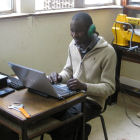By: George Achia
Send to a friend
The details you provide on this page will not be used to send unsolicited email, and will not be sold to a 3rd party. See privacy policy.
Researchers say weak policy undermines Kenya's innovation landscape, but hope new science projects will shake things up, reports George Achia.
[NAIROBI] It was a chance remark. During a visit to a Kenyan factory in 2009 technology specialist Kamau Gachigi was told about a problem with a machine at a plant that makes guns and bullets for the army.
Three teams of consultants from industrialised countries had been brought in to fix the machine, and failed. They recommended that it should be scrapped and replaced.
SPEED READ
- Innovators say institutional failures have held back technology in Kenya
- But new science parks could give technological development the boost it needs
- New funds and parks are expected to support young innovators and link science to industry
Gachigi took a look for himself and persuaded defence officials to let two talented Kenyans do the job: Vincent Musyoka and Simon Wachira, both electrical and electronics engineering graduates from the University of Nairobi.
"Not only did they fully repair the machine, but they also fixed the touch screen on it, leaving the machine much better than when it was new," recalls Gachigi.
It was another success for the University of Nairobi's FabLab — a creative hub for engineers, designers, innovators and business people, and the common factor linking the know-how and innovative spirit of Gachigi, Musyoka and Wachira.
Grassroots innovation
Wachira is technical director of a company he founded when he left FabLab, Musyoka was inspired by the time he spent at FabLab as a student, and Gachigi is the FabLab coordinator.
Musyoka typifies the creative, entrepreneurial approach that the FabLab seeks to engender. "The FabLab was very valuable to me as it offered a platform for peer learning, self-learning and motivation which eventually influenced who I am today," he tells SciDev.Net.
On graduation in 2005 he turned down a comfortable, well-paid job with an audit company to follow his passion: innovation and engineering. He started a company, Tekno International, which designs and builds automated industrial systems such as closed circuit television, security systems, and the robots and computer systems for their control.
He has built a reputation for problem solving, and was recently appointed the national adviser on robotics to the Kenyan government.

Kenya needs to do more to get technology from labs to market, experts say
FabLab
Gachigi, who is also a lecturer at the university's Department of Mechanical and Manufacturing Engineering, says: "The FabLab offers an environment to assist people with good ideas by helping them to acquire intellectual property rights and to pitch their ideas to investors".
Although the lab was set up only four years ago, it has turned out products and services which are already on the market, some of which have won national, regional and international awards and honours.
For example, in May 2012 FabLab student Peter Mbari won a NASA International Space Apps Challenge award for his 'Bit Harvester'.
This remote monitoring system uses a global system for mobile communications technology and microcontrollers to collect data and information including voltages, wind speed and current on wind turbines located in rural areas. The information can be stored in a centralised database and used by energy provider companies to monitor turbines.
Government hurdles
But despite FabLab's successes, things have not always been rosy for Gachigi and his team.
He complains about the lack of equipment at the lab, and expresses disappointment with the government, which he says seems less interested in locally-made products than in buying products from abroad. As a result, he says, the government has "not put in place policies to support local technology".
Nevertheless, the lab has proved its value in building bridges between universities and industry — to such an extent that the University of Nairobi is now preparing to take another step forward: it has set aside a 600-acre plot about 14 kilometres northwest of the capital to expand the FabLab into an industry, science and technology park.
Gachigi says similar parks in other countries have proved their value as a support base for small and medium enterprise (SMEs) working on technology.



Science parks hope to nurture new technologies, such as Mbari's wind turbine project
Flickr/warrenski
The existing FabLab will remain at the university, but a second one will be housed at the park, in close proximity to business people who could help move new products to market.
This is potentially of enormous significance for Kenya, partly because the gap between universities and society — including SMEs — is holding back the country's manufacturing sector, according to Benson Kariuki, director of the University-Industry Liaison office at the Jomo Kenyatta University of Agriculture and Technology (JKUAT).
"Knowledge coming from the universities through research does not penetrate to the community to help address societal woes," Kariuki says.
He says that the lack of interaction between academia, society, industry and policymakers has held back innovation.
But he hopes that new science and technology parks can correct the failure to commercialise research, through their remit of getting ideas out of the lab and into the marketplace.
Gathering momentum
Others agree. In January, Kenya's outgoing president, Mwai Kibaki, led government officials and potential investors in a 'ground-breaking' ceremony for an information, communication and technology park, on a 5,000-acre site at Konza, 60 kilometres south of Nairobi.
The government has allocated 1 billion Kenyan shillings (US$12 million) for the initial stages of the 900 billion shilling (US$10 billion) project, with officials looking to the US's Silicon Valley in California as a model.
JKUAT is also set to construct a science and industrial park on a 32-acre site at its campus 30 kilometres from Nairobi. Its aim is to play a role in Kenya Vision 2030, a development blueprint which envisages Kenya becoming a middle income economy by 2030.
"The tender for fencing the JKUAT's science and industrial park site has been awarded and, on completion the park's construction will begin immediately," Kariuki tells SciDev.Net.
In support of these efforts, the government has created a 400 million Kenyan shilling (US$4.7 million) science, technology and innovation fund to support research and innovation, says Shaukat Abdulrazak, chief executive officer of Kenya's National Council for Science and Technology.
This will go a long way in providing start-up funds for young innovators, he says.
"Our problem in Kenya has always been that innovation is not turned quickly enough into concrete products for the market," Abdulrazak adds.
But he hopes "science parks will lead the way in helping Kenya close the innovation-implementation gap in order to increase global competitiveness".
Link to University of Nairobi Science and Technology Park document
See below for an interview with Kamau Gichigi:
George Achia currently holds an IDRC/SciDev.Net science journalism internship award.
More on Capacity building


Script media release
Journalists offered ‘big break’ mentoring opportunity from Radio Nigeria
03/04/19












